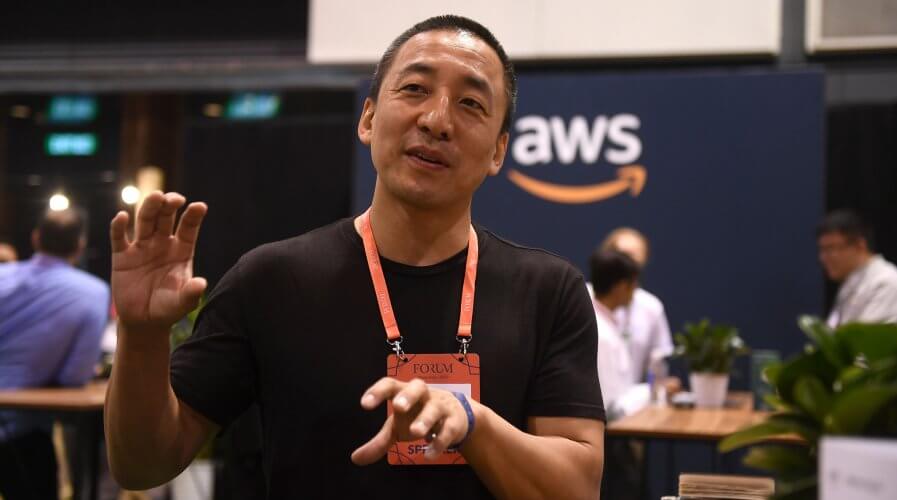
GIPHY CEO Alex Chung at RISE 2019 Conference. Source: Harry Murphy/RISE via Sportsfile
CEO Alex Chung explains why GIPHY is the Google of animations
ALTHOUGH GIPHY was founded in 2013, CEO Alex Chung says that the business is just 18 months old because the team has only recently started monetizing the platform and is already signing seven-figure deals with brands.
GIPHY is an online database and search engine that offers short looping videos with no sound — resembling animated GIF files.
The company’s team and its partners add new GIFs to their platform every day, based on current events, movies, brand commercials, award shows, football games, and the likes.
The world of GIFs is incredibly exciting because the animated files help users express themselves, as they do with emoticons, but with much more impact, context, and nuance. GIPHY is at the very center of that world.
“We have about a billion plus searches (for GIFs) every day — about 15 to 20 percent of the global search traffic volume,” Chung told Tech Wire Asia in an exclusive interview at the RISE 2019 Conference in Hong Kong.
While Chung claims that the company is still a startup and faces the same challenges as any other young business, GIPHY is in an envious spot in the startup world given the phenomenal brand value and recognition it has created thus far.
“We modeled ourselves after Google”
“Before the company even started, we thought, if we had to grow the product to a certain point, what would the business model look like?
“And it was very simple. I asked what is the most profitable business model on the internet — and the answer was Google.
“Google is the king of search, so our goal was always, if you can get enough search, then you can just follow the Google business model because you have a search based product.”
What makes GIPHY’s plan interesting is that it works in a tiny niche that Google doesn’t really focus on right now. Over the past few years, it seems as though the company has really become a pioneer in that space.
“We optimized our search platform for a vocabulary set that nobody searches for on Google. We have 100 million people searching for the word ‘hungry’ every day, for example, and we have interesting results to show.”
How exactly does GIPHY make money?
Like Google, GIPHY makes its money from ads on the platforms. Unlike Google, however, the company doesn’t compete for clicks or impressions. Instead, it trades on attention, virality, and brand value.
“Eighty percent of the digital ads market is controlled by Google and Facebook. The remaining 20 percent is where others such as Snapchat, Pinterest, Twitter compete for business.
“However, while they compete for performance, we work with brands to help market themselves better.
“Companies such as Coke and McDonalds aren’t chasing clicks, They’re trying to create brand experiences and get their brand message across. That’s where GIPHY comes in.
According to Chung, GIPHY is competing with television and see GIFs as 6-second pre-rolls that not only create an impact but also allows brands to slip into personal conversations that people have every day — all resulting in incredibly high engagement.
When brands work with GIPHY, they’re featured on the top/first spots for words like “hungry”, “thirsty”, and others that are uniquely suited to the animation-driven platform.
“GIPHY works with big lifestyle brands, movie producers, musicians, and everyone else who is looking to create engaging content on our platform.”
The incredible opportunity ahead for GIPHY
Chung has primarily been focused on the US markets in the past, but coming to Asia for the RISE 2019 Conference was a way to check out the impact that his brand has made in this part of the world.
“It’s phenomenal when you think about it. We’ve been seeing and analyzing different trends. GIPHY being (a little) data-intensive, it’s definitely something that’s more popular where access to data is easy. It’s definitely something that resonates with the connect millennials — but it also has appeal among other demographics.”
An interesting thing Chung revealed was that Asia is quite diverse in its actions and behaviors.
For example, there’s a huge spike every morning when Indias use GIPHY to search for “Good Morning” GIFs. Koreans, on the other hand, don’t seem to like to say good morning.
The reality, however, is that GIPHY is almost as popular in Asia as it is in the US and the platform is expected to get bigger and better with more interesting and engaging content in the works.
Chung is really proud that GIPHY is already integrated into a majority of the messaging apps that people use around the world — including WhatsApp.
While GIPHY’s team is raring to go, winning new deals and improving the platform every day, Chung is in no rush.
“Startups such as Facebook and Google took six to 10 years before they established themselves. We’ve just begun our journey.”
READ MORE
- Ethical AI: The renewed importance of safeguarding data and customer privacy in Generative AI applications
- How Japan balances AI-driven opportunities with cybersecurity needs
- Deploying SASE: Benchmarking your approach
- Insurance everywhere all at once: the digital transformation of the APAC insurance industry
- Google parent Alphabet eyes HubSpot: A potential acquisition shaping the future of CRM










